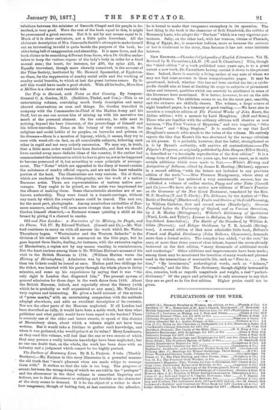NEW Entrions.—Chambers'sCyclopuedia of English Literature. Vol. IL Revised by R.
Carrnthers,LL.D. (W. and R. Chambers.) This, though the "third edition " of a work published some years ago, is to a great extent a new work, Dr. Carruthers having carried it down to the present time. Indeed, there is scarcely a living anther of any note of whom we may not find some account in these comprehensive pages. It may he questioned, indeed, whether this has not been carried too far; a cycle- paulia should aim at least at limiting its scope to subjects of permanent value and interest, qualities which can scarcely be attributed to some of the literature here mentioned. It is better, however, to err on the side of completeness. The criticism seems to us, for the most part, sensible, and the extracts are skilfully chosen. The volume, a large octavo of eight hundred pages, is a treasury of good reading.—We have also to mention a complete edition of The Poetical Works of John Keats, the Aldine edition ; with a memoir by Lord Houghton. (Bell and Sons.) Those who are familiar with the ordinary editions will observe as new features, " The First Version of Hyperion," and two tragedies, " Otho the Great" and "King Stephen." It is needless to say that Lord Houghton's memoir adds much to the value of the volume. He entirely rejects the idea that Keats's life was shortened by the savage criticism on his poems. It is probable, however, that the belief, strengthened as it is by Byron's authority, will survive all contradictions.—The Pilgrim's Progress, as originally published by John Bunyan (Elliot Stock), is described as "a fat-simile reproduction of the first edition." It is a cheap form of that published two years ago, but more exact, as it omits certain additions which were made to that.— White's History and Antiquities of Selborne, edited by James E. Harting, (Bickers), appears in a second edition, " with the letters not included in any previous edition of the work."—Miss Florence Montgomery, whose story of " Misunderstood" has achieved a very considerable success, has re- published a volume of earlier stories, Peggy and other Tales (Cassell and Co.).—We have also to notice new editions of Winer's Treatise on the Grammar of the New Greek Testament, translated by the Rev. W. F. Moulton (T. and T. Clark) ; The Dilemma, by the Author of " The Battle of Dorking" (Blackwood); Traits and Stories of thelrishPeasantry, by William Carleton, first and second series (Routledge); Sermons Preached before the University of Oxford, and on Various Occasions, by J. B. Mozley (Rivingtons); Webster's Dictionary of Quotations (Ward, Lock, and Tyler) ; Lessons in Religion, by Mary Gillies (Sun- day-School Association); The Battle of the Standard, by William A. Gibbs (Provost); and Eclogce Ovidiance, by T. R. Arnold (Riving- tons). A second edition of that most admirable little book, Belbws's French and English Dictionary (John Bellows, Gloucester), demands more than a formal notice. The compiler has added, " at the cost," he says, of more than three years of close labour, beyond the seven already bestowed on the first edition, "many thousands of additional words and renderings." Other additions and improvements have been made ; among them may be mentioned the insertion of many words and phrases used in the transactions of mercantile life, such as "Free to . . . . Sta- tion," "By instalments," archaeological words, such as "dolmen," " cromlech," and the like. The dictionary, though slightly increased in size, remains, both as regards magnitude and weight, a real "pocket- dictionary." Of the paper and printing it is only necessary to say that they are as good as in the first edition. Higher praise could not be given.


































 Previous page
Previous page